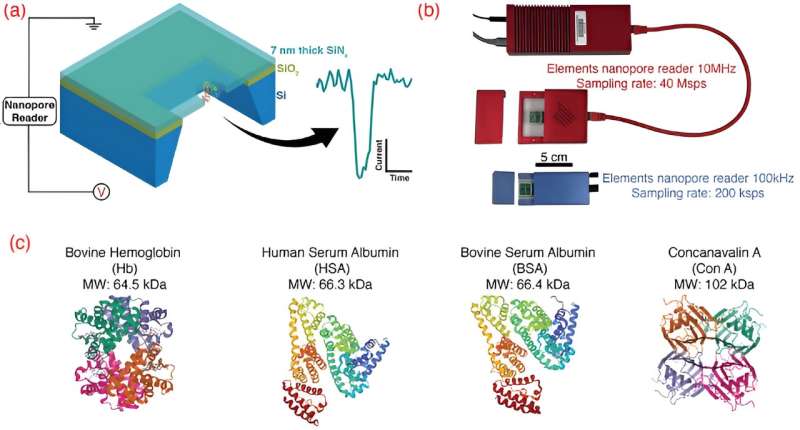This article has been reviewed according to Science X's editorial process and policies. Editors have highlighted the following attributes while ensuring the content's credibility:
fact-checked
peer-reviewed publication
trusted source
proofread
Simple test could help predict risk of Alzheimer's disease 20 years in advance

A simple, cheap and non-invasive blood test could help predict a person's risk of developing Alzheimer's disease up to 20 years before symptoms show.
Physicists from The Australian National University (ANU) have come up with a way to use nanotechnology, combined with artificial intelligence (AI), to analyze proteins in blood to search for signs of early neurodegeneration, or tell-tale "biomarkers" that point to the onset of Alzheimer's.
The ANU physicists have developed an ultra-thin silicon chip containing "nanopores"—tiny, nanometer-sized holes that analyze the proteins one at a time with help from an advanced AI algorithm. The research is published in Small Methods.
Although there is no cure for Alzheimer's, ANU Ph.D. researcher Shankar Dutt said knowing whether someone is at risk of developing Alzheimer's 20 years before a potential diagnosis could significantly improve health outcomes for patients.
"If that person can find out their risk level that far in advance, then it gives them plenty of time to start making positive lifestyle changes and adopt medication strategies that may help slow down the progression of the disease," he said.
A small amount of blood is placed on the silicon chip and inserted into a portable device, about the size of a mobile phone, which uses the AI algorithm to search for signatures corresponding to the proteins that show signs of early onset Alzheimer's.
The ANU scientists say the algorithm can be trained to screen for multiple neurological conditions at the same time, including Parkinson's disease, multiple sclerosis (MS) and amyotrophic lateral sclerosis (ALS).
"Currently, Alzheimer's is mostly diagnosed based on evidence of mental deterioration, by which stage the disease has already seriously damaged the brain," said co-author Professor Patrick Kluth, from the ANU Research School of Physics.
"Early detection, which is vital for effective treatment, normally involves invasive and expensive hospital procedures such as a lumbar puncture, which can be physically and mentally taxing for patients.
"Our technique, on the other hand, requires only a small blood sample and patients could receive their results in near real-time.
"The quick and simple test could be done by GPs and other clinicians, which would eliminate the need for a hospital visit and prove especially convenient for people living in regional and remote areas."
Proteins are the building blocks of life and contain distinct genetic blueprints, unique to each individual, that hold important clues about our health, including signs of decaying brain cells.
Dementia is the second leading cause of death for Australians. It's estimated more than 400,000 Australians are living with dementia, with that number expected to more than double by 2058.
"Alzheimer's disease is the most common form of dementia and currently there is no cure," Professor Kluth said.
"We know the risk of developing dementia is three to five times higher for Aboriginal and Torres Strait Islander people compared to the general Australian population."
The researchers describe finding the proteins with signs of early neurodegeneration like searching for a needle in a haystack.
"Blood is a complex fluid that contains more than 10,000 different biomolecules. By employing advanced filtration techniques and harnessing our nanopore platform, combined with our intelligent machine learning algorithms, we may be able to identify even the most elusive proteins," Dutt said.
It's hoped the ANU screening technique could be made available within the next five years.
More information: Shankar Dutt et al, High Accuracy Protein Identification: Fusion of Solid‐State Nanopore Sensing and Machine Learning, Small Methods (2023). DOI: 10.1002/smtd.202300676





















